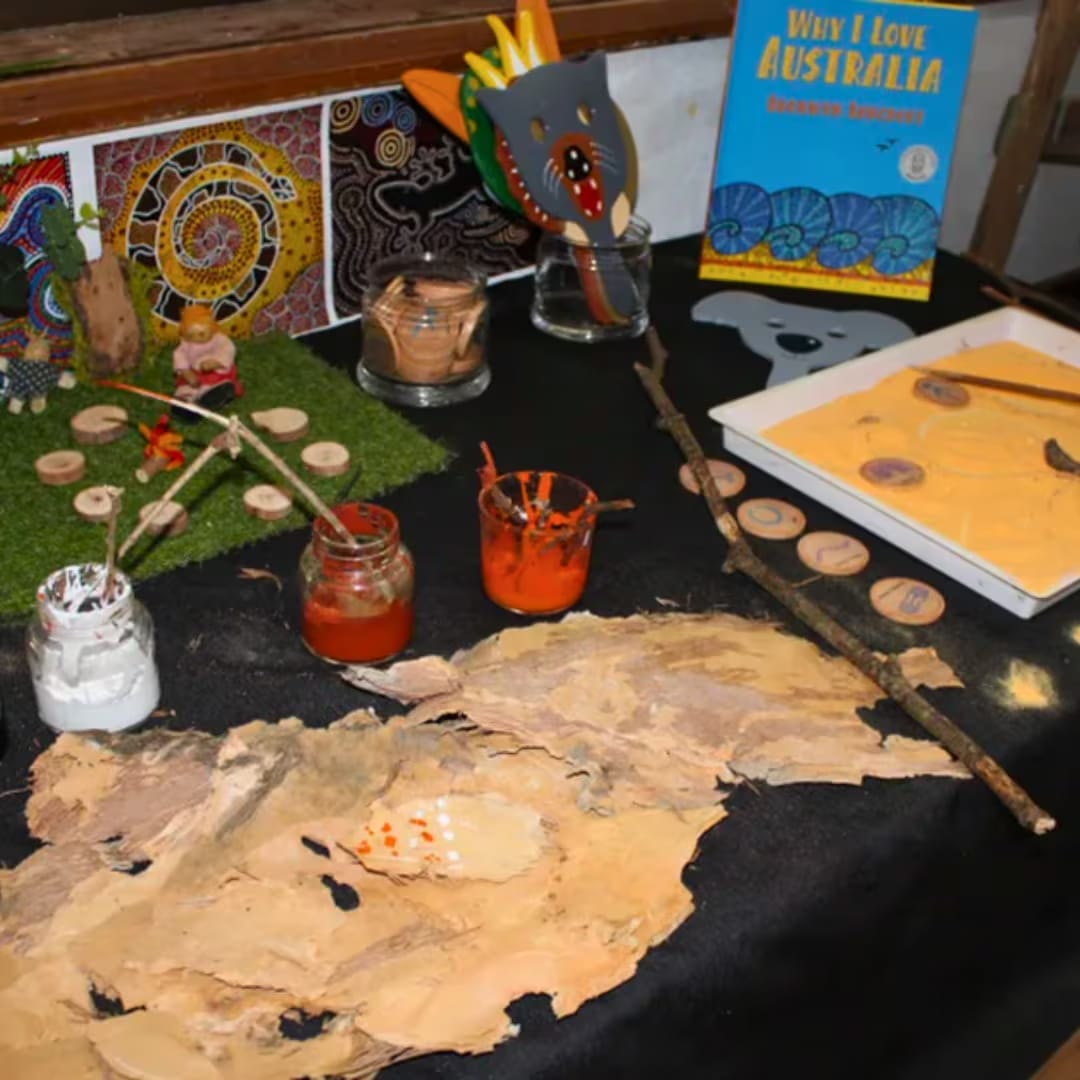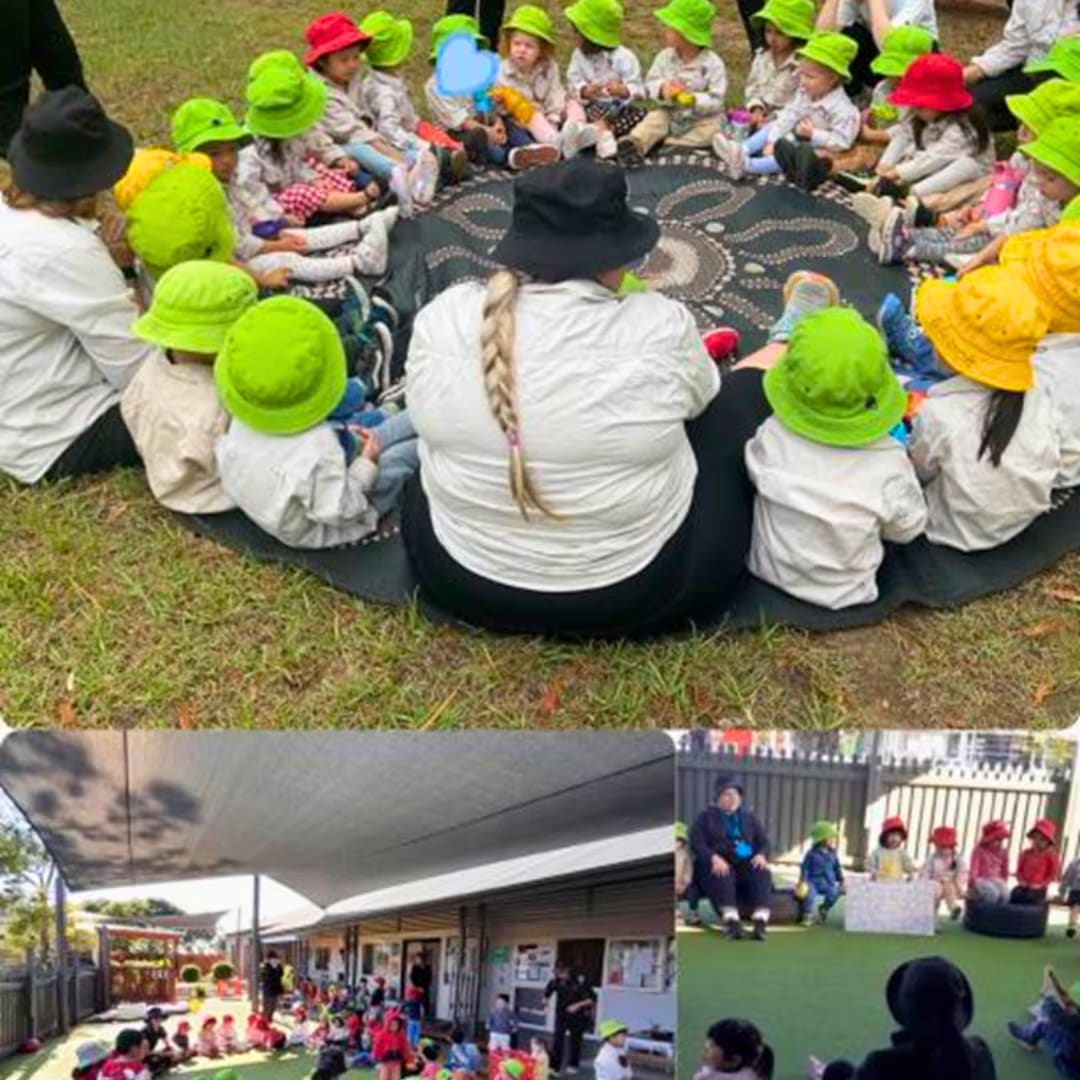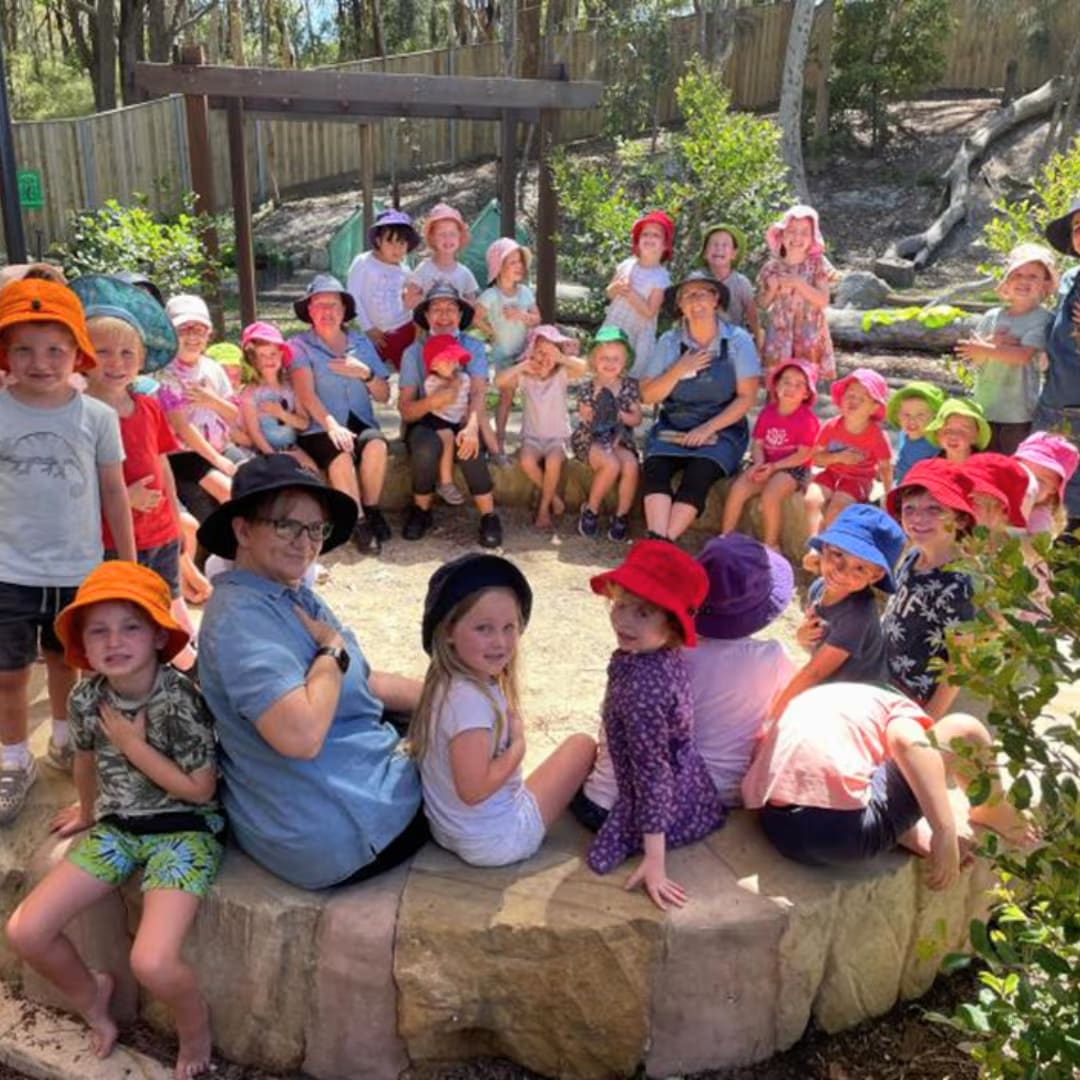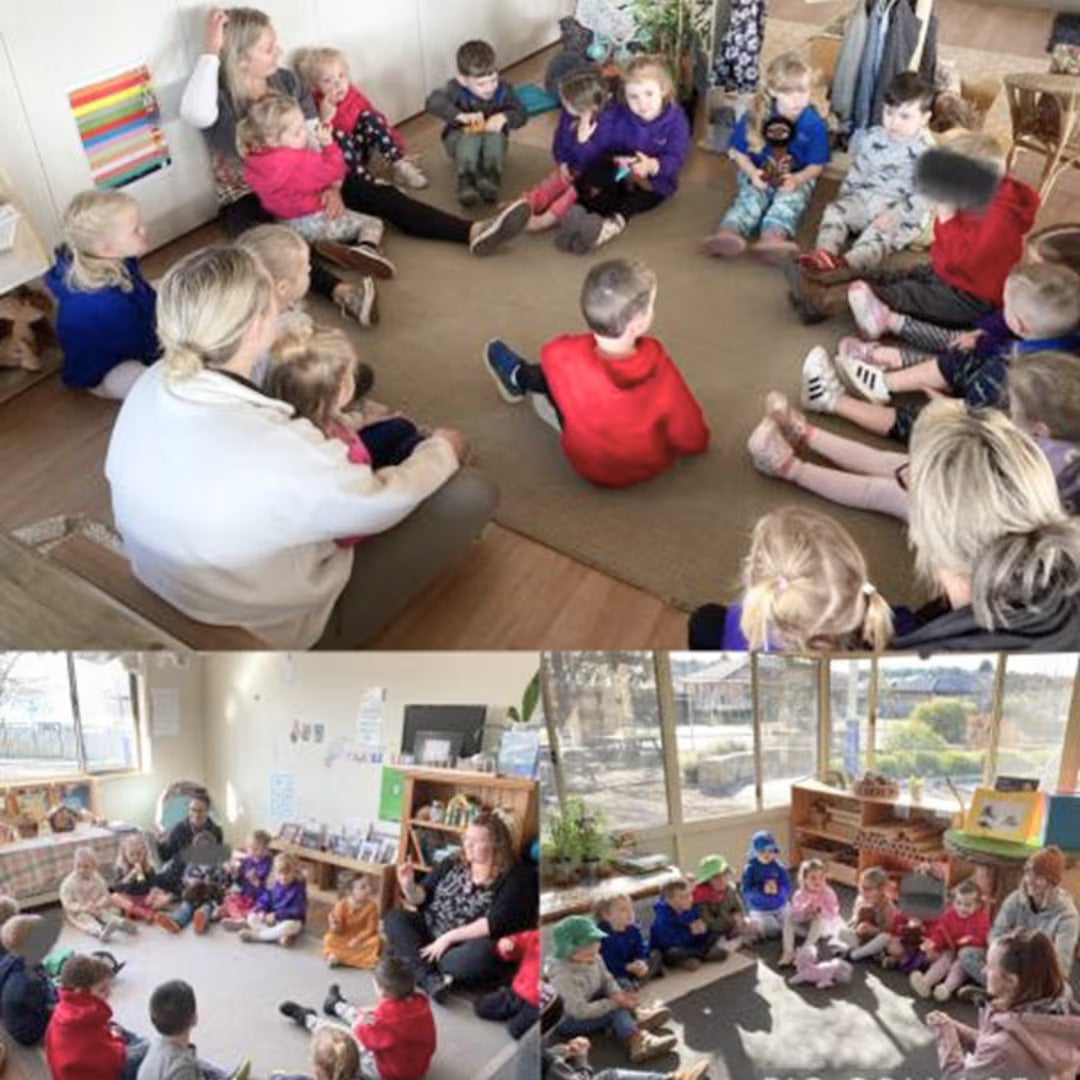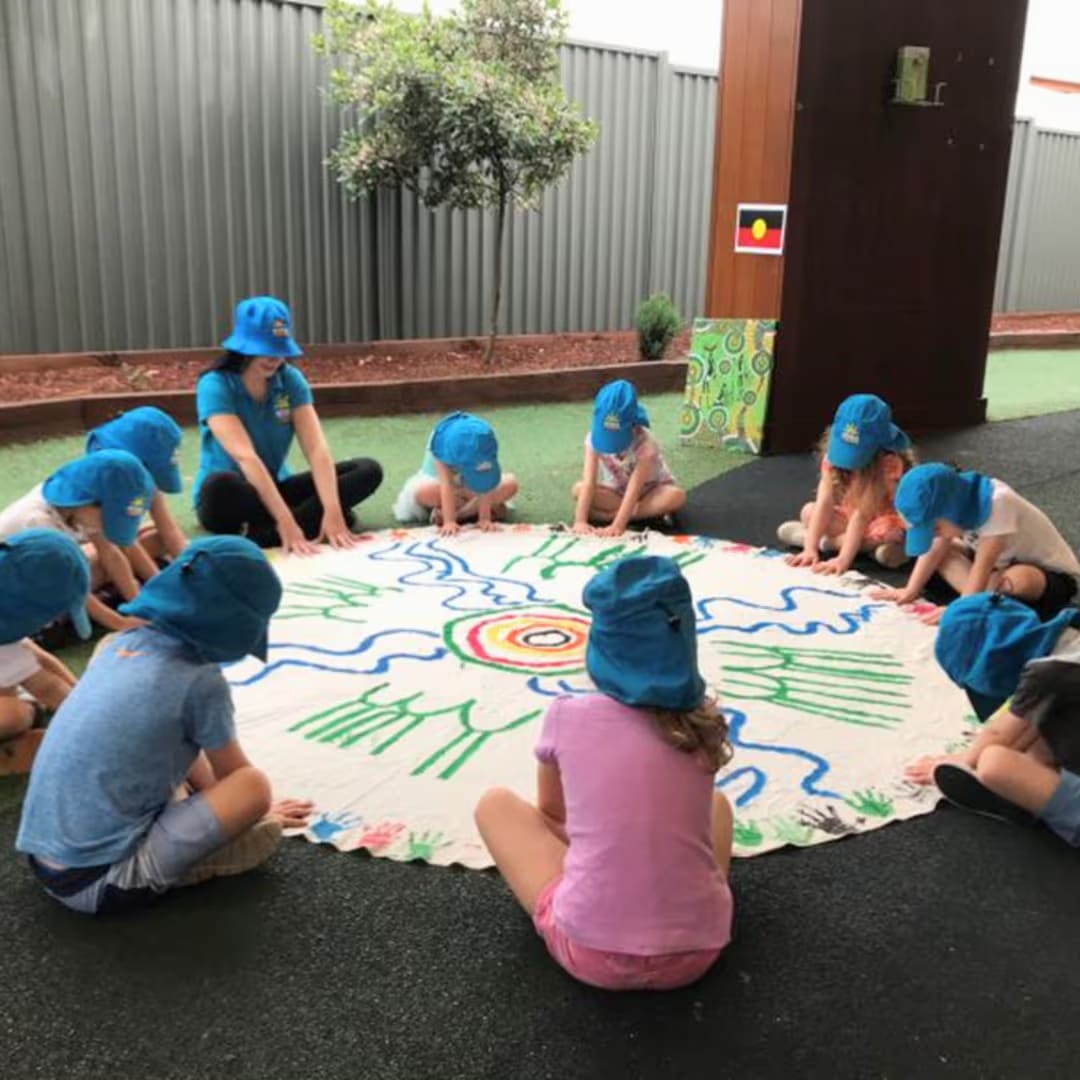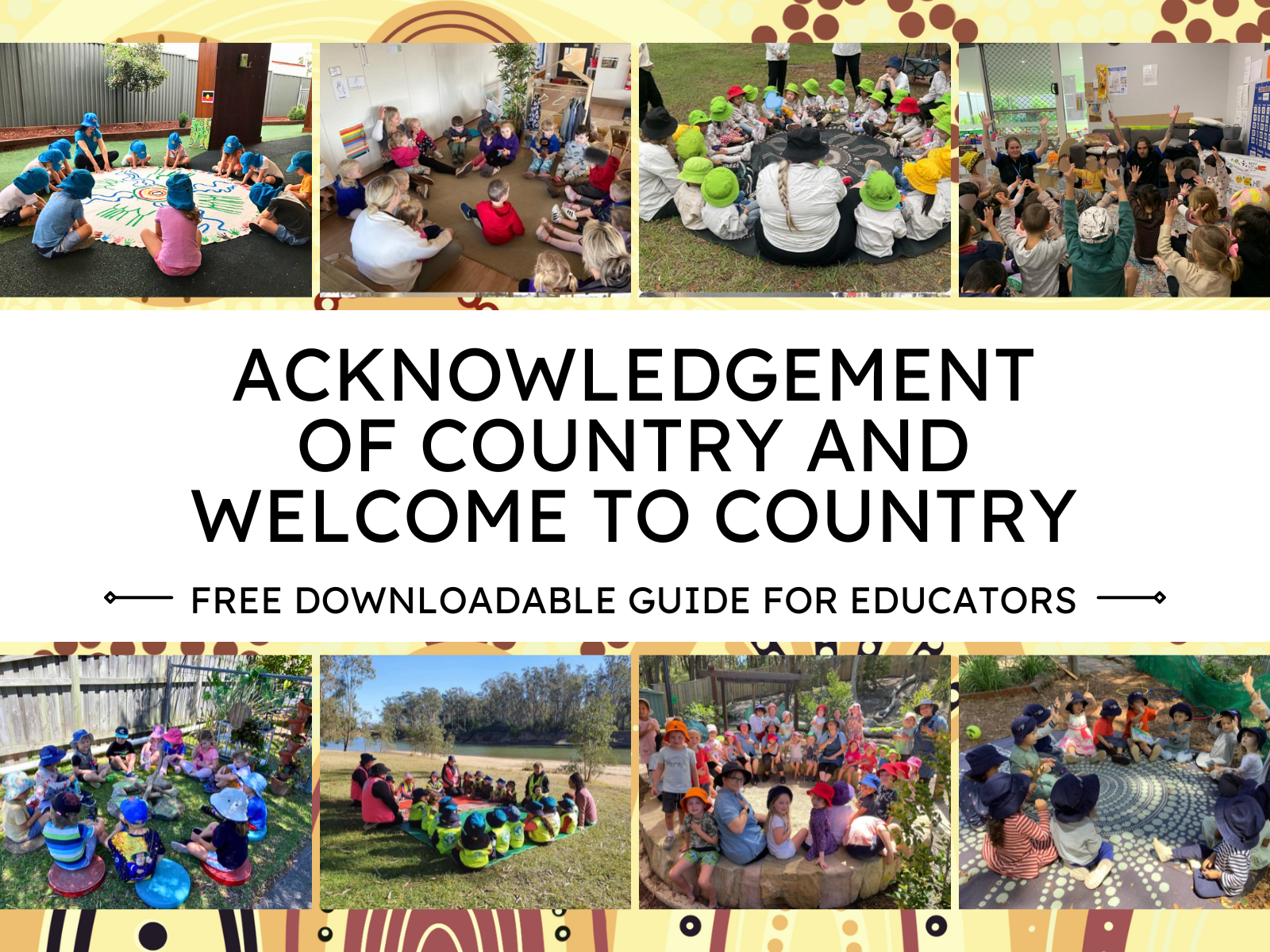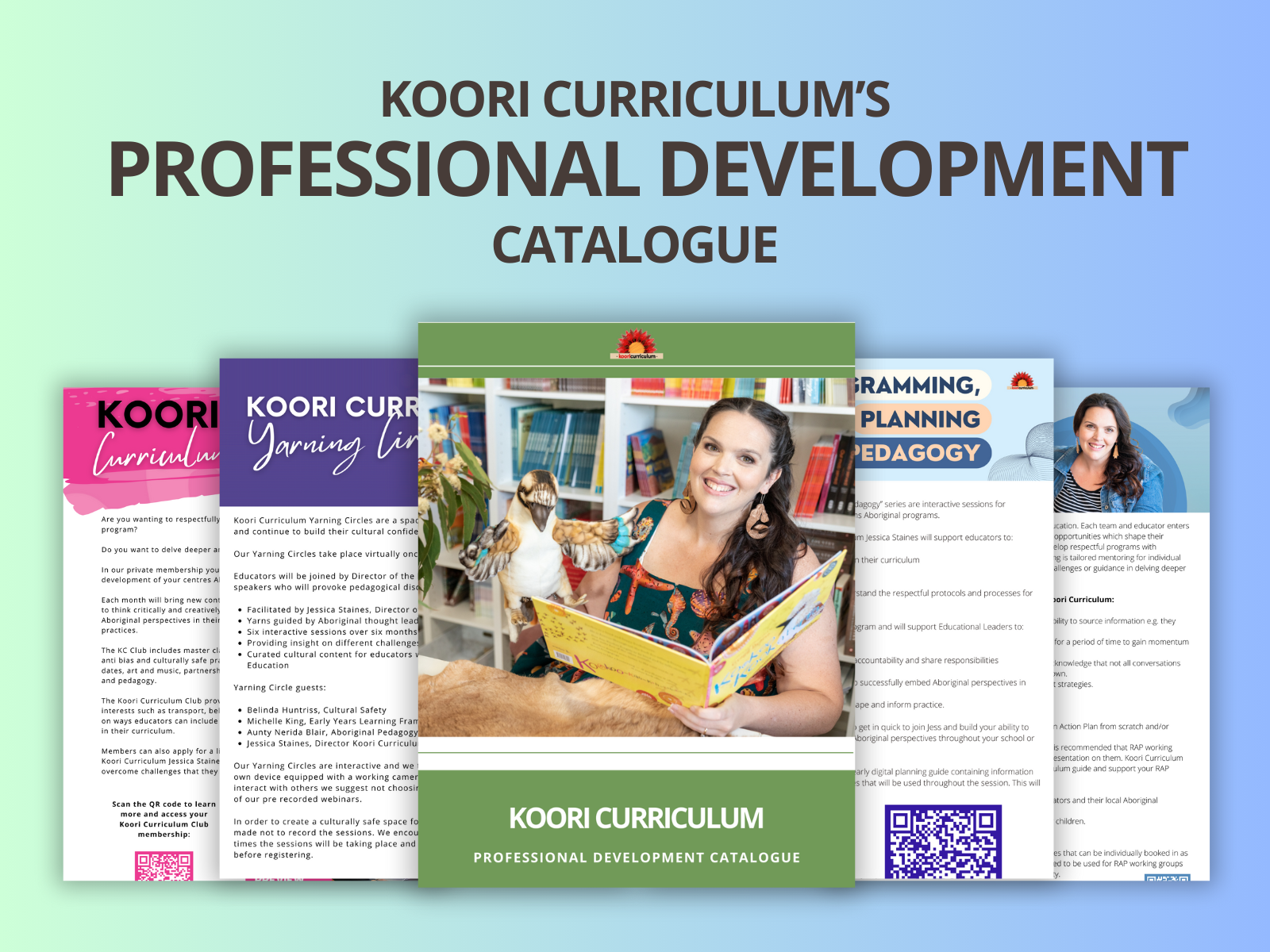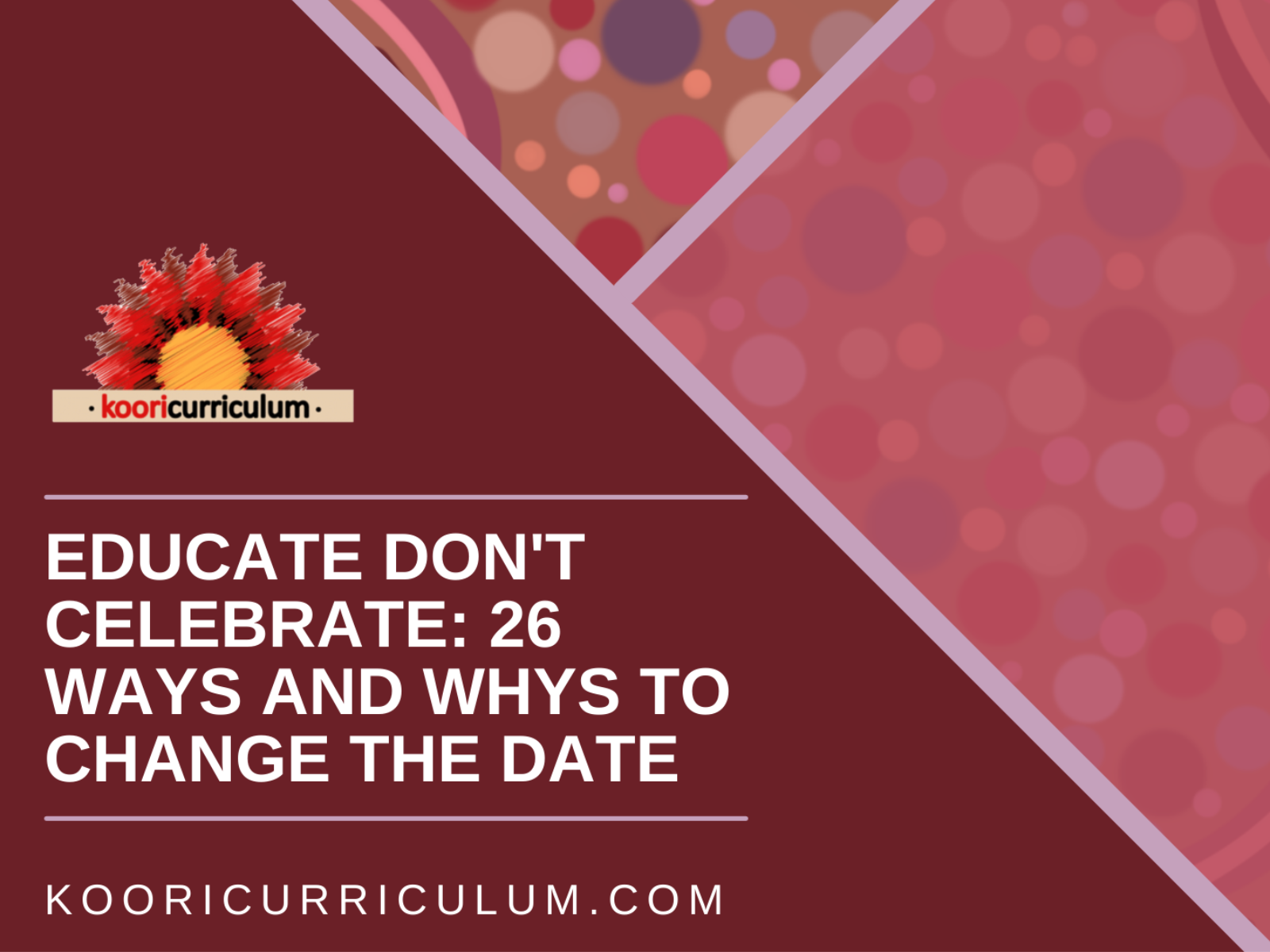
Acknowledgement of Country and Welcome to Country
Koori Curriculum acknowledges the Traditional Custodians of the lands where we work and live.
We celebrate the diversity of Aboriginal peoples and their ongoing cultures and connections to the lands and waters of Australia.
We pay our respects to Elders past and present and acknowledge the Aboriginal and Torres Strait Islander people that contributed to the development of this resource.
We advise this resource may contain images, voices or names of deceased persons in photographs, film, audio recordings or historical content.
Practical Applications Within the Early Years Learning Framework (EYLF) 2.0
Acknowledging and Welcoming Country are crucial practices that demonstrate respect and recognition for Aboriginal and Torres Strait Islander peoples.
These practices not only honour the Traditional Custodians of the land but also promote an inclusive and respectful environment for all.
By understanding and implementing these protocols, early years educators in Australia can make significant strides in supporting and respecting the cultural heritage of Aboriginal and Torres Strait Islander communities.
Outcome 1: Children Have a Strong Sense of Identity
- Outcome 1.1:Children feel safe, secure and supported when they for example share ideas and information about their culture and cultural artefacts.
- Outcome 1.1:Children feel safe, secure and supported when Educators support this learning when they for example provide a culturally safe place where Aboriginal and Torres Strait Islander children and children from culturally diverse backgrounds can share their stories about history and culture.
- Outcome 1.4:Children learn to interact in relation to others with care, empathy and respect when they for example establish and maintain respectful, trusting relationships with other children and educators.
Outcome 2: Children Are Connected with and Contribute to Their World
- Outcome 2.1:Children develop a sense of connectedness to groups and communities and an understanding of their reciprocal rights and responsibilities as active and informed citizens, when they for example begin to recognise there is a diversity of cultures, traditions and family structures.
- Outcome 2.2:Children respond to diversity with respect which is evident when Educators create opportunities for open and authentic partnerships with all families, communities and organisations, including with Aboriginal and Torres Strait Islander people and organisations, and those from culturally diverse backgrounds.
- Outcome 2.3:Children become aware of fairness when Educators for example provide opportunities for children to investigate ideas, complex concepts and ethical issues that are relevant to their lives and their local communities.
Outcome3: Children Have a Strong Sense of Wellbeing
- Outcome 3.2:Children become strong in their physical learning and wellbeing when they recognise the contributions they make to shared projects and experiences.
- Outcome 3.2:Children become strong in their physical learning and wellbeing when for example Educators welcome children and families sharing aspects of their culture and spiritual lives to create culturally safe environments.
- Outcome 3.4:Children are aware of and develop strategies to support their own mental and physical health and personal safety when Educators show genuine affection, understanding and respect for all children.
Outcome 4: Children are confident and involved learners
- Outcome 4.2:Children develop a range of learning and thinking skills and processes such as problem solving, inquiry, experimentation, hypothesising, researching and investigating when they connect with their local Aboriginal and Torres Strait Islander community (e.g. Elders, role models) to engage with stories about place-based history and culture.
- Outcome 4.3:Children are confident and involved learners when they transfer and adapt what they have learned from one context to another, for example, when they make connections between experiences, concepts and processes.
- Outcome 4.3:Children are confident and involved learners when they transfer and adapt what they have learned from one context to another when by providing opportunities for all educators to participate in acknowledging Country and how this can be used in different settings.
Understanding the Importance of Acknowledgement and Welcome to Country
An Acknowledgement of Country and Welcome to Country sound similar but there are some very key differences. This article explains the nuances and provides ideas for educators on how they can include Welcomes and Acknowledgements in their practice.
Incorporating an Acknowledgement of Country and/or Welcome to Country into meetings, gatherings, and events shows respect by upholding Aboriginal and Torres Strait Islander cultural protocols. Taking the time to Acknowledge Country, or including a Welcome to Country at an event, reminds us that every day we live, work, and dream on Aboriginal and Torres Strait Islander lands.
Historically, protocols for welcoming visitors to Country have always been a part of Aboriginal and Torres Strait Islander cultures. Boundaries were clear, and crossing into another group’s Country required a request for permission to enter. When permission was granted, the hosting group would welcome the visitors, offering them safe passage and protection of their spiritual being during the journey. Visitors had to respect the protocols and rules of the land owner group while on their Country.
Today, while these protocols have been adapted to contemporary circumstances, the essential elements remain, welcoming visitors and respect for Country.
Welcome to Country
Welcome to Country is delivered by Traditional Owners, or Aboriginal and Torres Strait Islander peoples who have been given permission from Traditional Owners to welcome visitors to their Country. Your local Aboriginal Land Council or Native Title representative body can advise on organising a Welcome to Country by a Traditional Owner in your area.
Welcome to Country occurs at the beginning of a formal event and can take many forms including singing, dancing, smoking ceremonies, and/or a speech.
Acknowledgement of Country
An Acknowledgement of Country is an opportunity for anyone to show respect for Traditional Owners and the continuing connection of Aboriginal and Torres Strait Islander peoples to Country.
How to Offer an Acknowledgement of Country
An Acknowledgement of Country can be offered by any person and like a Welcome to Country, is given at the beginning of a meeting, speech or event.
There is no specific wording for an Acknowledgement of Country, just be sincere and, if possible, do some research on the Country you are acknowledging.
Suggested Wording:
"I’d like to begin by acknowledging the Traditional Owners of the land on which we meet today. I would also like to pay my respects to Elders past and present."
"I’d like to begin by acknowledging the Traditional Owners of the land on which we meet today, the (people) of the (nation) and pay my respects to Elders past and present."
Aboriginal and Torres Strait Islander peoples may also wish to acknowledge their own mob/s and other First Nations peoples present.
An Acknowledgement of Country can be expressed on behalf of an organisation in different forms of communications, such as email signature blocks, websites, and on social media.
Example:
"Reconciliation Australia acknowledges the Traditional Owners of Country throughout Australia. We pay our respects to Elders past and present."
How to Acknowledge Country
Here are some ideas from the Koori Curriculum educator community across different age groups on the ways you can deliver an Acknowledgement of Country:
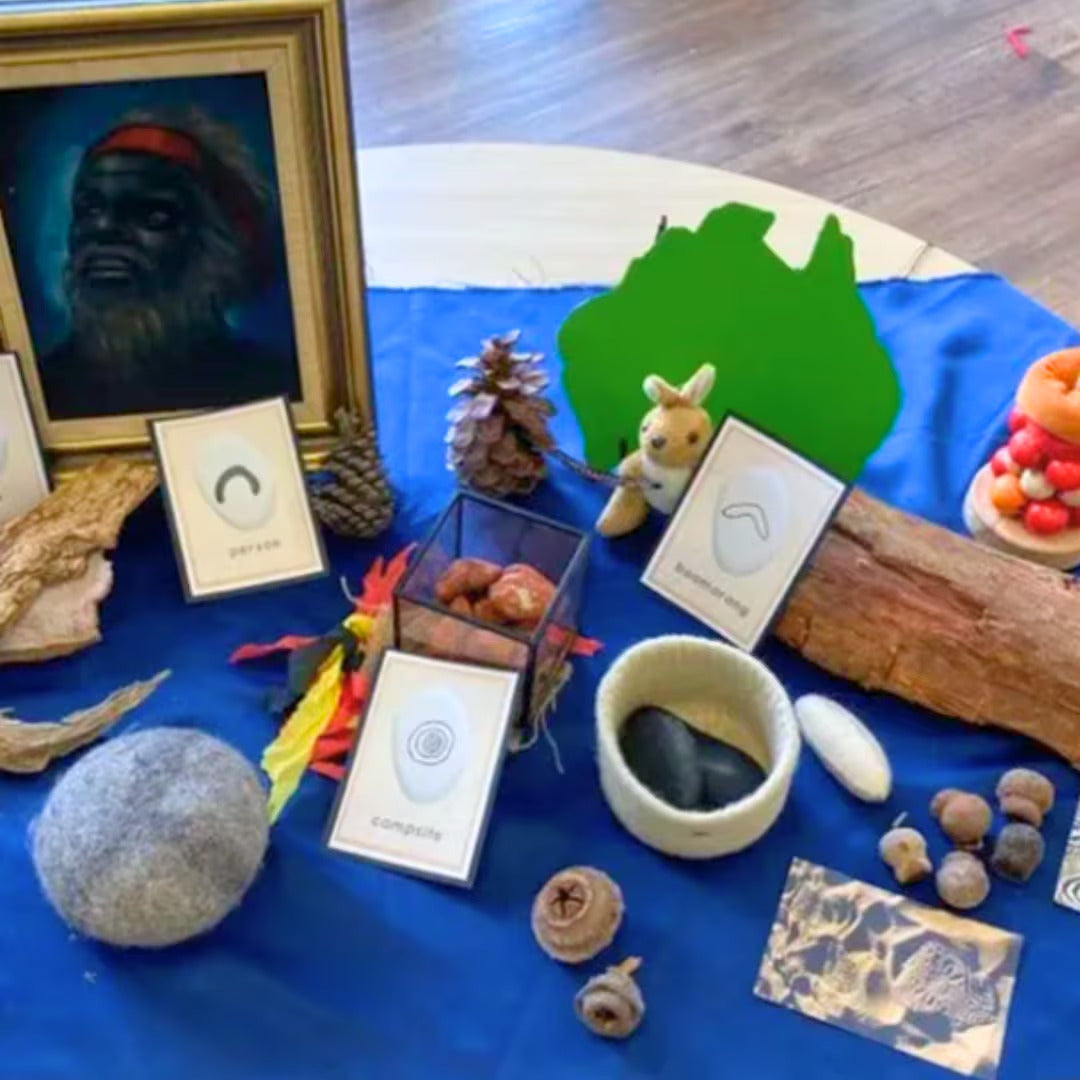
Simple Provocations for Nursery Room
Children in the nursery room at Nido Early School engage with simple provocations involving loose parts and animals to explore Aboriginal symbols and perform Acknowledgements of Country.
Age Group: 0-2 years
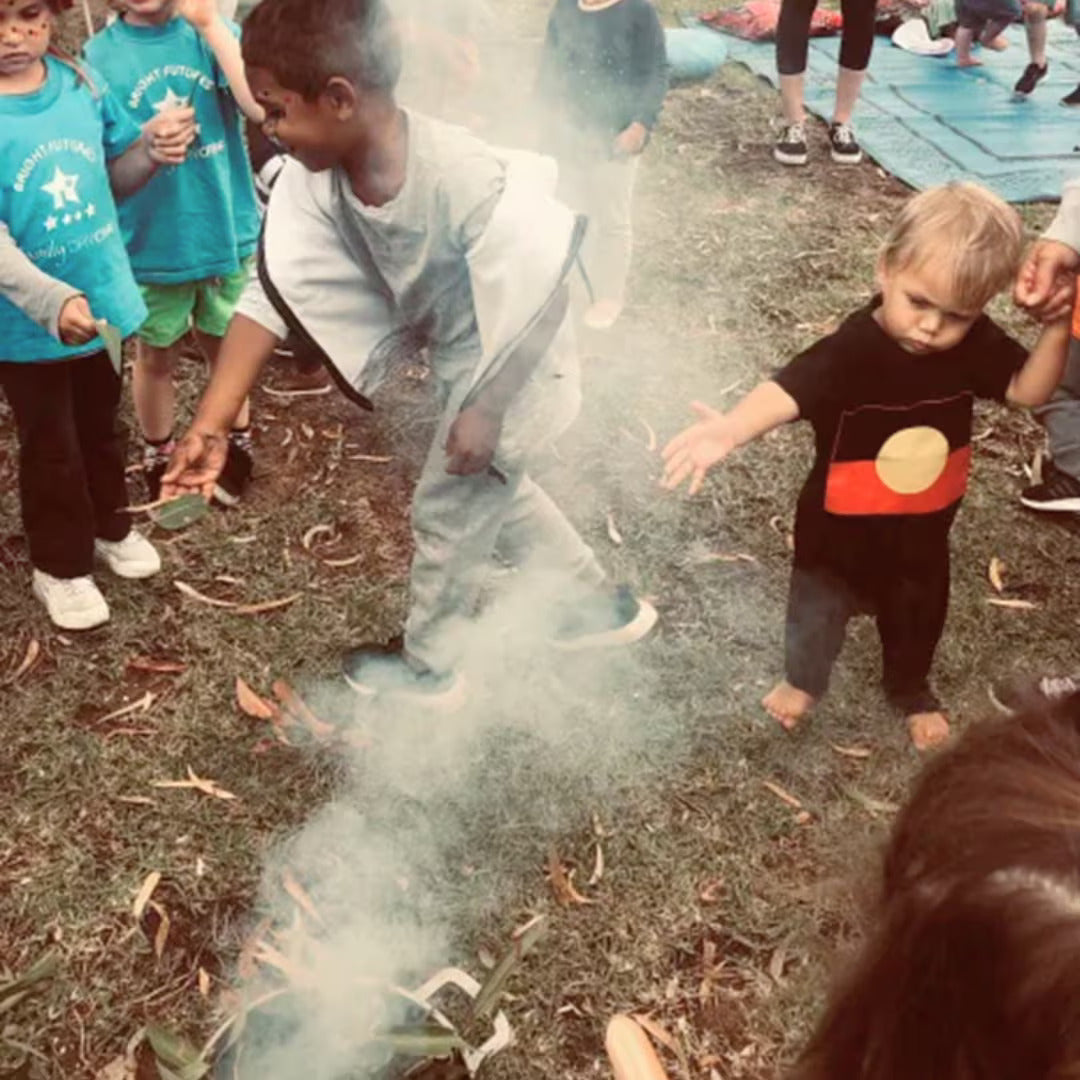
Smoke Ceremony and Cultural Respect
Bright Futures Children’s Services hosted a smoke ceremony as part of their NAIDOC celebrations, establishing a strong cultural connection and respect for past and present cultures.
Age Group: 2-5 years
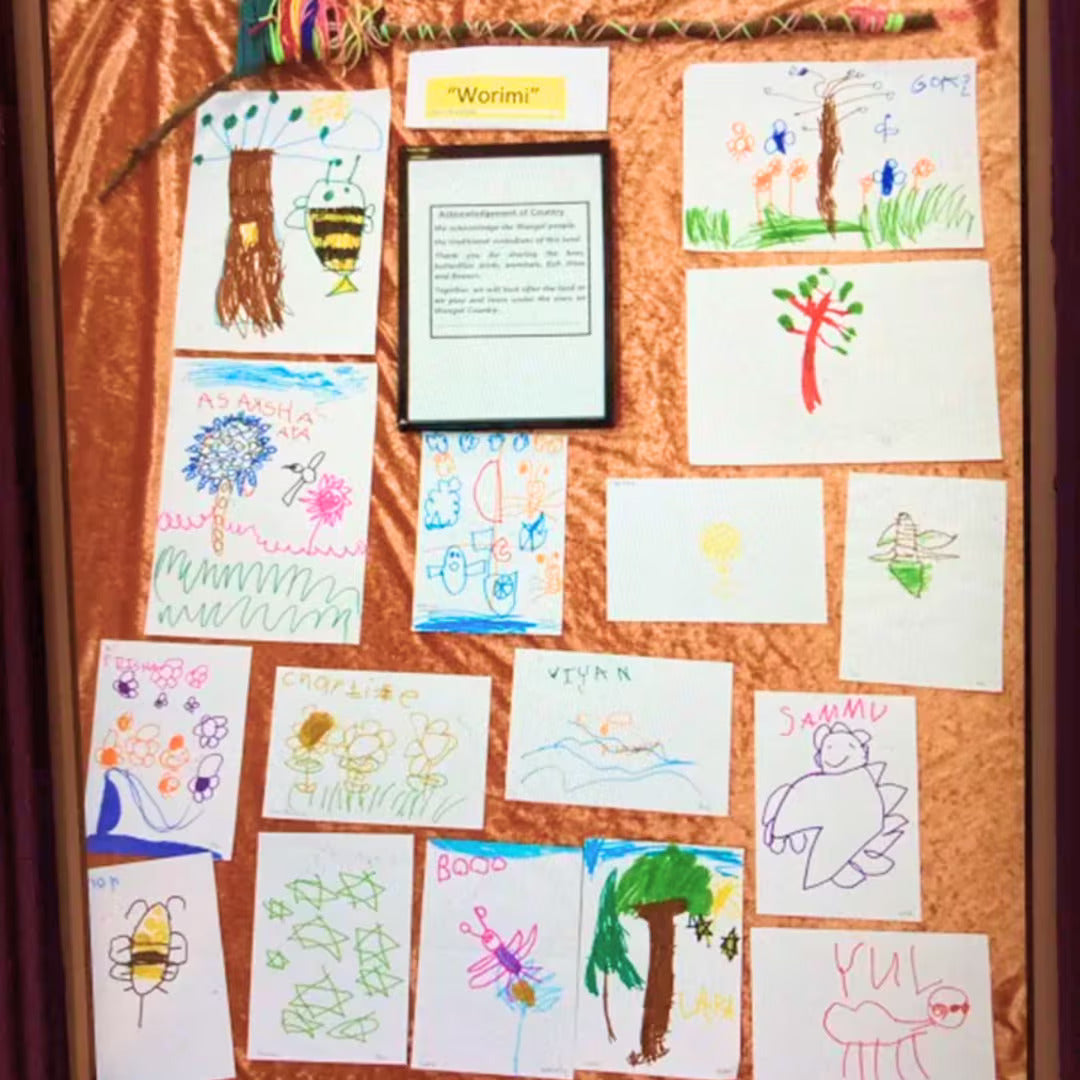
Multimodal and Auslan Inclusion:
Anne Turner’s centre used used multimodal texts and visual language and expanded their Acknowledgement to include Auslan signs for various elements like birds, bees, and trees, enhancing inclusivity and understanding of Aboriginal cultures.
Age Group: 3-5 years
"Acknowledgements of country and traditional owners are something that decent non-Indigenous people give, not because they feel pushed into it but because they believe it is the right thing to do."
- Koori Mail Editorial
Why Acknowledging Country is Important
Aboriginal and Torres Strait Islander peoples have experienced a long history of exclusion from Australian history books, the Australian flag, the Australian anthem and for many years, Australian democracy. This history of dispossession and colonisation lies at the heart of the disparity between Aboriginal and Torres Strait Islander and other Australians today.
“[Acknowledgement of Country] says to the world, and more importantly to ourselves, that we accept the fact we are in a place that has a history and story far beyond 220 years. It says to our Aboriginal and Torres Strait Islander fellow Australians that we are all in the future journey of our country together.”
— Richard Wynne, Minister for Aboriginal Affairs, Victoria
EYLF Outcome 4.3:Children are confident and involved learners when they transfer and adapt what they have learned from one context to another for example, when providing opportunities for all educators to participate in acknowledging Country and how this can be used in different settings.
The Distinction Between ‘country’ and ‘Country’
In Aboriginal and Torres Strait Islander cultures, the meaning of Country is more than just ownership or connection to land, as Professor Mick Dodson explains:
“When we talk about traditional ‘Country’…we mean something beyond the dictionary definition of the word. …we might mean homeland, or tribal or clan area and we might mean more than just a place on the map. For us, Country is a word for all the values, places, resources, stories and cultural obligations associated with that area and its features. It describes the entirety of our ancestral domains."
We recommend Educators obtain a copy of "Country" By Aunty Fay Muir and Sue Lawson, illustrated by Cheryl Davison to explore the concept of Country with children.
Acknowledgement of Country Examples
In Person:
"I acknowledge (insert Traditional Custodians name) on the lands that we are meeting today. I pay my respects to Elders past and present and celebrate the diversity of Aboriginal peoples and their ongoing cultures and connections to the lands and waters of (insert state/Nation)."
Documents or Online Resources:
"We (enter organisations name) acknowledge the Traditional Custodians of the lands where we work and live. We celebrate the diversity of Aboriginal peoples and their ongoing cultures and connections to the lands and waters of (insert state/Nation). We pay our respects to Elders past and present and acknowledge the Aboriginal and Torres Strait Islander people that contributed to the development of this tool/resource. We advise this resource may contain images, voices or names of deceased persons in photographs, film, audio recordings or historical content."
Online:
"I acknowledge that I am hosting/recording this meeting/webinar from the lands of the (insert Traditional Custodians name). I also acknowledge the Traditional Custodians of the various lands on which you all work today and the Aboriginal and Torres Strait Islander people participating in this meeting/webinar. I pay my respects to Elders past and present and celebrate the diversity of Aboriginal peoples and their ongoing cultures and connections to the lands and waters of (insert state/Nation)."
Common Questions about Acknowledgements of Country
Should we include ‘Custodians’ or ‘Traditional Owners’?
Both terms are in use. 'Custodians' reminds of the ongoing obligation to look after country, and that Aboriginal people don't own the land, but it owns them. Australian law recognises that Aboriginal and Torres Strait Islander people have rights and interests in the land and sea under their traditional laws and customs - that they are ‘Traditional Owners’.
How do we know the Nation name we are on?
Research the correct First Nation on whose ground you do the acknowledgement. If there is a known dispute about boundaries (which happens occasionally), choose a more neutral form. The AIATSIS Map of Indigenous Australia provides further information on Traditional Owners.
Should we avoid Using 'Emerging Leaders' or ‘Emerging Elders’?
Avoid this term as it may cause discomfort within the First Nations community.
Professor Megan Davis explained to the University of Sydney:
“We have loosely traced the inclusion of 'emerging leaders' and 'emerging Elders' to the Queensland public service. It is an artefact created by bureaucrats, that spread across the country.” “The notion of ‘emerging Elders’ does not make sense from a cultural perspective. If you want to recognise local Elders, best to keep it to Elders past and present,” Prof. Davis says.“Don’t worry, you won’t offend any emerging ones – they don’t exist.”
Should we say ‘thank you’?
When one thanks Aboriginal and Torres Strait Islander peoples for sharing the land it insinuates that we had a choice and that the land was shared willingly. Australia is an invaded Country and Indigenous peoples sovereignty was never ceded, there has never been a treaty or any form of agreement regarding the “sharing” of land. Therefore, thanking Indigenous peoples for the sharing of the land is defunct.
We recommend books “Somebody's Land”, “Sacred Hill” and“Day Break” to explore this further with children.
"We would encourage you to inform yourself and reach out rather than just list nations you have been told or searched on Google."
- Dr Marcus Woolombi Waters
Examples of Acknowledgement of Country from the Koori Curriculum Educator community
Warners Bay Early Learning & Care Centre Inc
We would like to submit our children's Acknowledgement to Country:
We play and learn on Awabakal land,
We stand on this country hand in hand.
From the sky to the sea and the land below,
Our love and respect we will always show.
For the Awabakal people long ago and today,
We’ll care for the land in the same way.
The photo is of one the toddler room learning areas.
The area evoked excitement, active engagement and a plethora of learning opportunities. The educators created an open ended space for exploration.
Including a small world play space, Creative arts, where we engaged in reciprocal conversations with children about painting styles and different representational images, Sand tray drawing where the children could draw animal tracks, or create their own patterns, Literature and animal masks for dancing and role playing.
Perfect Beginnings Holmead Road
In 2021 Perfect Beginnings Holmead Road undertook professional development training after recognising that educators had a common interest in wanting to expand their knowledge in embedding Indigenous Practices into our daily programs. 'Raindrops of Diversity' training run by Aunty Janice (elder from the Logan region) and Michelle saw educators attend many online and in person training sessions.
Collaboratively, Aunty Janice, Michelle and service chef Aunty Faye (also of Indigenous background) supported the embedding of Indigenous practices.
In addition to the planning of events like National Sorry Day, NAIDOC Week and National Reconciliation week the team also worked hard to improve their room physical environments, by adding more natural and Indigenous resources.
Following these changes and further research, Aunty Faye suggested daily we join as a whole service community to do an Acknowledgement of Country. We adopted our Acknowledgement of Country, and also thought a song would create an engaging experience for the children.
The song "STOMP" by Aunty Sharon and Sue Lewin was trialled by Kindergarten, and was loved and received well by all. The whole service followed Kindergarten's lead and decided that the sandpit would be our gathering space each morning. To deepen engagement, we ordered some clapping sticks from an Indigenous company, and ordered a sign with the lyrics to the song so families and other members of the community who are in the service at the time of the Acknowledgement of Country could join in too.
After the daily Acknowledgement of Country educators take a moment to share messages, sing happy birthday to children and recognise special events happening around the world, or in our local community (cultural holidays etc). The embedding of our Acknowledgement of Country has shaped the way our mornings run and has seen positive change come in waves. The location of our Acknowledgement of Country is also adaptable to weather, children's suggestions and planned experiences, such as when we are out on our weekly Bush Kindy trips. Almost daily our Acknowledgment of Country receives positive feedback from families, or guests in the service, and the children continually show excitement to do it. Our way of Acknowledging the Country we are blessed to live, play, learn and work on is unique to our service, but feel it represents our philosophy and curriculum perfectly.
The Discovery Garden Childcare Centre and Preschool
The children and educators at The Discovery Garden Childcare Centre and Preschool are all enthusiastic and respectful participants in our daily Acknowledgment to Country.
When the children hear the tapping sticks outside they all know to take themselves to the yarning circle to have a yarn and pay their respects to our Awabakal people.
Our Acknowledgement to Country talks about thanking our Awabakal people for letting us share their land and respecting the land, sea, sky and ourselves.
Through yarning with the children it has evolved over the year (we have only been open less than 12 months) and before long our Acknowledgment grew to include respecting and acknowledging our friends and teachers also.
From there our Acknowledgment grew to including the Awabakal word 'Kaayi' (hello) which was taught to us by our much loved Awabakal elder, Uncle Nolan. We look forward to Uncle Nolan teaching us more language in the coming year.
Lastly, our children were curious as to why one of our educators places her hand on her heart whilst reciting our Acknowledgment to Country.
Her response was that when she places her hand on her heart it makes her feel like she has a connection with our mother earth. Our children really liked this and most of them now place their own hands on their hearts when participating in our Acknowledgment to Country.
Our Acknowledgment to Country is such an important part of our day at The Discovery Garden and we can't wait to see where our children, educators and Uncle Nolan take it to next.
Pied Piper Preschool
Pied Piper Preschool
“We Care for ourselves, we care for our Mudji (Friends), we care for the animals, and we look after the Wiradjuri land on which we learn and play, Yindyamarra”
Pied Piper Preschools Acknowledgement of Country was developed collaboratively with the children, staff, and 1st nations people within our local community. Our aim was to develop an acknowledgement that was personal to our preschool and relevant to the local Wiradjuri area. We asked the children to look beyond the preschool fence and tell us what they could see.
Their voices and thoughts were documented on floor book pages and provided the foundations of our acknowledgement.
We then collaborated with members of our local indigenous community to include some Wiradjuri language into our acknowledgement – Mudji (friends) and Yindyamarra –(respect).
“Yindyamarra’’ also means to go slow, to give honor and take responsibility. Yindyamarra is an important practice that is incorporated into our services philosophy and daily play, learning and routines at Pied Piper. We have incorporated some simple KWS (key word sign) for certain words including ourselves, mudji, animals, land, and play, including our non-verbal children in our daily acknowledgement.
We wanted to keep Our acknowledgement simple yet meaningful, allowing the children to be involved and giving them an understanding of the importance of acknowledging the traditional custodians of the land on which we learn and play at Pied Piper.
Every morning at Pied Piper the children come together for our “morning meeting”.
We sit in a circle, with our aboriginal and Torres Strait islander dolls, and our Acknowledgement of Country is led by our leader for the day. We discuss what “Yindyamarra” we have seen or how we can practice this within our day at Pied Piper, developing the children’s understanding or kindness and respect for the land and each other.
Rise & Shine Kindergarten Sylvania
Rise & Shine Kindergarten Sylvania would like to acknowledge the Dharawal people, who are the traditional custodians of this land on which we stand upon today. We would also like to pay respect to the elders, past and present of the Dharawal nation and extend that respect to other Aboriginal people present.
Our 'Unite' element in our Shine Advantage Curriculum is about teaching children to be socially responsible towards others and their environment, learn compassion, kindness and respect for diversity.
This involves weaving diversity into the fabric of children's everyday lives, talking openly about identity and heritage and affirming the rich diversity of our community backgrounds. This helps children make bridges across cultures and traditions and builds positive identities and a respect for differences.
As part of our curriculum each day, the Preschool children say an ‘Acknowledgement of Country’ to acknowledge and pay respect to the Traditional Owners and ongoing custodians of this land. The children meet and sit around our Yarning mat, which was made by the children and their educators. The symbols represent, the meeting place, running water and the land.
Acknowledgement of Country:
We at Rise & Shine Kindergarten,
Would like to say thank you,
To the Dharawal People,
Who are the Traditional Custodians of this land.
For letting us share your land,
We promise to look after it,
The animals and the people too.
Hello land! (touch the land)
Hello sky! (reach for the sky)
Hello me! (hug yourself)
Hello friends! (open arms wide)

